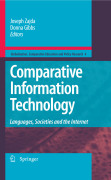
This volume offers a critique of the nexus between ICT and its impact on society, individuals and educational institutions. One of the most significant dimensions of globalisation has been the rapid development of information and communications technologies (ICTs). Our lives have been changed by ICTs in numerous ways and the implications for education are enormous. The ICTs have transformed the linguistic, cognitive and visual dimensions of human communication, as well as our perceptions of the self, and social identity in the global culture. They have facilitated the development of new dimensions of digital literacy, such as blogging and sms messaging. In this sense, cyberlanguage continues to evolve by borrowing and adapting familiar words, coining new expressions, and embracing particular styles. The book provides directions in education and policy research, relevant to transformational educational reforms in the 21st century. Examines recent research dealing with ICT, cultural identity and pedagogy Explores conceptual frameworks and methodological approaches applicable in the research of ICT, globalisation and pedagogy Demonstrates ideological imperatives of technodeterminism affecting cultural identity and pedagogy Provides strategic education policy analysis on recent developments in information technology and cultural identity research INDICE: Preface. Acknowledgements. Contributors. 1. Information Technologies and Global Learning: Introduction. 2. Abstract Tools and Technologies of Learning: An Evolving Partnership. 3. E-Learning in Schools: Making Successful Connections. 4. What is Needed For Global E-Learning in Higher Education. 5. Mobile Learning: The Significance of New Mobile and Wireless Communications Technologies for Education. 6. Connecting Schools to their Communities: The South-East Asian Experience. 7. Activity Systems and Digital Literacy in Adolescents. 8. Using Online Discussions: Reflections from Teaching in Teacher Education.9. Development of IT- infrastructure for Rural Connectivity: A Pro-Poor approach to e-Governance for Rural Development in India. 10. The Development of Effective Evaluation Methods for E-Learning. Index.
- ISBN: 978-1-4020-9425-5
- Editorial: Springer
- Encuadernacion: Cartoné
- Páginas: 180
- Fecha Publicación: 01/01/2009
- Nº Volúmenes: 1
- Idioma: Inglés
